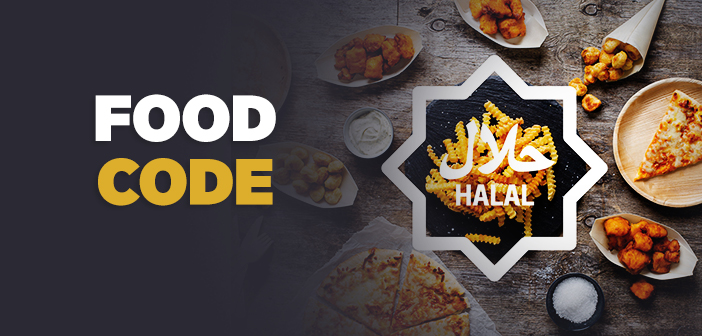What is food code?
Rizq is a bounty from Allah, may He be glorified and exalted, and therefore all food and drink should be received with the attitude of gratitude. The Prophet (peace and blessings be upon him), was very clear about the status of food and drink in life, when he said that the Muslims are those who do not eat unless they are hungry and when they eat, they do not fill themselves. Moreover, he taught that one third of the stomach is for food, one-third for liquids, and one-third for air. This means that food should be eaten moderately and with a healthy disposition. The new Muslim should know that all good acts, including eating and drinking, should commence with bismillah ar-rahman ar-raheem (in the name of God, the Most Merciful, the Most Compassionate). The Sunnah includes a number of other invocations, such as; “Oh Allah, bless us in that which You have provided for us, and shield us from the fire’’. At the end of any meal, small or large, it is Sunnah to say; ‘‘Praise be to God, who fed us and gave us drink, and made us Muslims.’’ All of this is based upon the knowledge that it is Allah, may He be glorified and exalted, who provides for all His creatures, therefore, wasting food is a sin; as Muslims it is our duty to try to give any leftover food to the needy people or to animals, instead of wasting it by disposing of it in the garbage etcetera.
The Islamic concept of halal (permitted) and haram (forbidden) foods provides Muslims with some main dietary guidelines. In the Qur’an Allah states; ‘‘[Allah] has only forbidden you carrion and blood and the flesh of swine and anything over which a name other than that of Allah has been invoked. But if one is forced [to eat forbidden foods] by necessity and without willful disobedience nor transgressing due limits, then Allah is Oft-Forgiving Most Merciful’’[1] The principle is that whatever is not specifically or by analogy prohibited, is permissible; hence all foods and drinks are allowed except the following which are prohibited in the Qur’an. Allah says; “Forbidden to you (as food) are carrion and blood and swine flesh, and that which has been dedicated to any other than God and the strangled, and the dead through beating, and the dead through falling from a height, and that which has been killed by (the goring of) horns, and that which has been devoured by wild beasts except that which you make lawful (by killing it while it is still alive), and that which has been immolated to idols…” [2]; “Therefore eat of that on which Allah’s name has been mentioned if you are believers in His verses ” [3]; and, “Do not eat anything over which the name of Allah has not been mentioned. To do so is abomination. The devils inspire their friends to dispute with you. If you obey them, you would then be idolaters.”[4] All seafood is permissible according to the majority of the schools of law.[5] Whereas, anything that intoxicates or interferes with the clear functioning of the mind, in any quantity or form, i.e. alcohol and drugs, are clearly forbidden in Islam. By analogy, birds of prey, animals with claws and fangs, rodents and insects with the exception of locusts are also forbidden to consume in Islam. Nevertheless, for all of these forbidden foods there is an important maxim, which is that Muslims may eat any of these afore mentioned forbidden foods if they are facing starvation and their life is in danger. Furthermore, with the exception of the haram food items, most food is permissible, unless a forbidden substance has been processed with it, or if a particular food has been fermented to produce alcoholic content. In addition, Allah encourages Muslims in the Qur’an by saying;‘‘ Eat of the things that Allah has provided for you, lawful and good: but fear Allah in whom you believe’’[6] In this verse of the Qur’an ‘good’ refers to healthy and beneficial, signifying the notion that Muslims should not only consume what is merely halal for them, but that their food should also be healthy and beneficial for their physical, spiritual and mental wellbeing.
[1].Q. 16:115[2]. Q. 5:4, and 2:173, 6:145, 16:115[3]. Q. 6:118[4]. Q. 6:121[5]. Hanafi law does not allow such seafood as crabs, prawn and lobster.[6].Q. 2:172
Source: Islam For New Muslims An Educational Guide,Assoc. Prof. Amjad M. Hussain, Erkam Publications





